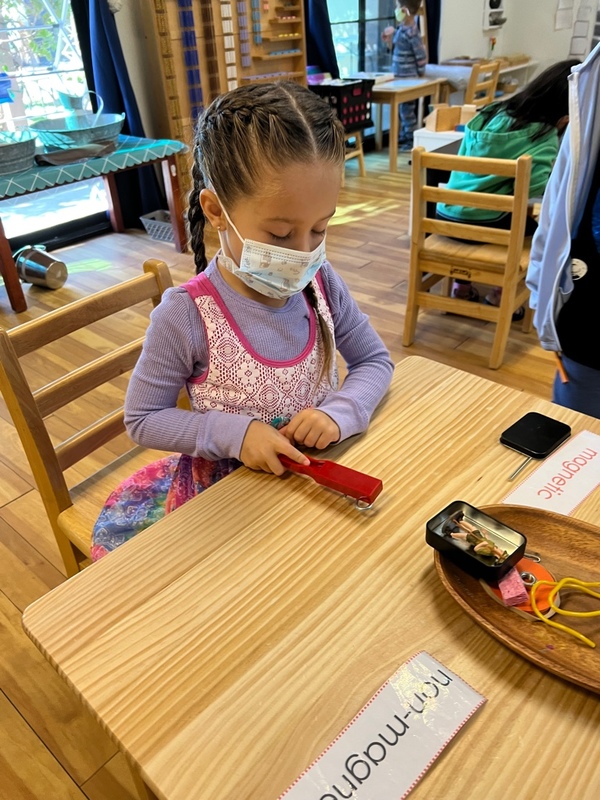(858) 759-0631
I would like to share with you a thought on the development of independence in our classroom. Dr. Maria Montessori defined the development of independence as follows: "The natural development of independence can be defined as the gaining of successive levels of independence. The urge to become independent is so strong that nothing can be stopped." -M.Montessori
Independence is a state of maturation or development where the child has achieved the capability of doing some activity on his own without help from others. Dr. Maria Montessori said that the development of independence happens in stages in a child; as soon as the child achieves one level of independence he goes on to develop another level of independence. For example, the development of independence in the capacity of eating food happens gradually. Initially, the baby can only drink milk, yet once he develops a capability of digesting food other than milk, he can be fed semi-solid food. When the baby starts growing teeth, the baby learns to digest food other than the mother's milk. He can now be given food that would require a certain amount of chewing and can be weaned off the mother's milk. In addition, the baby develops various organs in the body and requires more nutrition than what the mother's milk can provide. Furthermore, the baby has now become a child who learned how to hold objects and can be shown how to hold a spoon or a glass of milk.
A child of about 1 year old has an inner craving in him which says 'help me to do it by myself.' At this point, the parents or other adults around the child can help by showing him how to hold a spoon and eat by himself, how to put on his clothes and remove them, how to brush his teeth and how to wash his hands. This satisfies the child's inner need for independence. Slowly by about 6 years of age, the child would choose to be independent of adults. There are different types of independence a child goes through such as the independence of movement, of language, cultural independence, economic independence, social independence, and so forth. The best way to support the child to accomplish each development of independence is to provide him with tools; meaning ways and ideas on how to do certain things. We need to guide the child and show him the way. However, we must be aware of the child's readiness both physically and mentally before allowing him to take over the task. We want the child to succeed so he needs to be ready. Giving a child something he is not quite ready for will only end up having the child become dependent on us in doing it for him. So it's a must for the child to be ready.
Dr. Maria Montessori also talked about discipline, responsibility, and freedom with independence. She said that for a child to become independent, he needs to have inner discipline. The child acquires inner discipline when the adults set limits and provide order to the child. Only with inner discipline, he will acquire the capability of being independent. Then the child should be allowed to use his newfound independence through which he learns to take risks. When the child starts taking risks, he learns that he alone is responsible for his action and becomes responsible for himself. Once the child is responsible for himself, he can be given the freedom of doing that activity whenever he wants to. Thus, the child must have the inner discipline for him to work independently of the adult.
As soon as the child feels that he has the inner capability of doing some work independently, he seeks to do it himself. In our classroom, the child sees that there are so many materials that he can handle by himself because of their size. But, he needs to be shown how to handle the materials, so he can independently work with them. There are many things we can do at home as well which will help our children achieve their development of independence. Providing the child with clothing that will allow him to put on and remove by himself is one example. I understand that there are tons of adorable things available for children, but you could only see the frustration that the child feels when he is unable to unhook, unsnap, tie, or untie his belongings. He would then desperately ask others, specifically the adults around him to do it for him. On the other hand, imagine when the child can take care of himself and says "I did it!" Which scenario would we like for our child to encounter?
Let us, adults, be the guide and lead the child to his success. It is easier for us to do things for the child yet in a long run, who benefits from it?
Lastly, I would like to leave you with a quote, "Any unnecessary help given to a developing organism detains (or is an obstacle to) its growth." -M.Montessori.
Ms. Vicki, Bumblebee Teacher

